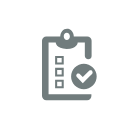ISO 17020
The standard looks at all the requirements testing and calibration laboratories and testing organisations have to meet to prove that they
- operate a quality system,
- are technically competent and
- can generate technically valid results.
How do I get ISO 17020?
Don’t be put off by thinking it is too complex a thing to do. We aren’t saying it’s simple, but with us doing the bulk of the work for you, including managing the whole process, it is relatively straightforward.
Here are the following stages to becoming and staying certified to ISO 17020:
- Comply with the relevant codes of practices that are mandatory in your sector (such as HSG 264 for asbestos management) and ensure you follow them
- Establish a system that complies with the standard
- Make everyone aware of the system and any changes in ways of working that have come about
- Operate the system to
a. Make sure it works efficiently
b. Build evidence of compliance with the requirements of the standard
c. Get staff familiar with it - Engage UKAS to accredit the system
- Keep using the system once it has been accredited (to keep the certificate)
There is more detailed information below about the various stages you need to go through.
Your ISO 17020 certification journey

Getting Started
- Provide a comprehensive briefing of what the standard asks you to do in simple to understand terms
- Approach UKAS to begin the process on your behalf as soon as we can. It is a drawn out process and they are typically booked out many months in advance.
- Begin to understand in detail how you operate
- Set a timetable and stick to it
- Decide what you want covered by the certificate – which sites, products and services. You can exclude some if you prefer.
- Put the right resources in place
- Identify who is going to be the Technical Manager and provide them with ongoing coaching during the project on their responsibilities
- Collect all existing documentation
- Establish a dedicated client portal on our collaboration and document sharing platform
- Begin establishing a dedicated system written just for you
- Identify any equipment that needs to be maintained, controlled &/or calibrated by a UKAS accredited lab
- Consider software used & how correct outputs are assured

Implementing
- Establish a detailed project plan in our online project management platform (and stick to it)
- Complete UKAS’ application forms (there are 2 – a general application and a body-type specific form depending on what you do) & submit
- Decide what you need operationally
- Understand what the standard and any relevant codes of practice requires you to do
- Help you get your paperwork in order (accurate and complete records are vital).
- Do a gap analysis
- Implement the system, ensuring all required documentation is completed & has been filled out correctly, such as:
a. Impartiality and confidentiality
b. Type A, B or C classification statement
c. Staff qualifications and training records
d. Sufficient re-surveys completed
e. Inspection records and reports are complete, compliant and accurate
f. Documentation is controlled - Brief staff on what they need to know & do
- Conduct an all clause internal audit
- Carry out a management review

Certification
ISO 17020 is an accredited standard, which means that in the UK only UKAS can audit you and issue a certificate. Beware, they operate on long lead times, so
- We approach them right at the start of the project
- When ready, submit the completed system for desktop review by UKAS
- Decide with you if you would like a pre-assessment visit by UKAS. We recommend not doing so.
- Undergo initial assessment. This is a comprehensive audit of documentation (especially records), compliance to the standard, and compliance to operational procedures and codes of practice where applicable (such as HSG 264 for asbestos management).
- Address the findings (there always are, that’s just how UKAS is) and submit evidence proving closure of the issues.
- Close out initial assessment
- Brief you on post-certification activity
- Support you during the 6 month surveillance audit (if required)(1)
(1) The certificate is valid for 4 years. 6 months after being initially accredited, UKAS returns to complete the first surveillance audit.
For more detail visit UKAS accreditation guidance.
FAQ’s
Just how hard is it?
There is no escaping the fact that as they are accredited standards, UKAS is very thorough in their auditing of your system, and are usually very knowledgeable in your sector. You do have to be precise in everything you do and say. You must make sure documentation is complete and accurate, and that staff absolutely follow operational processes.
However, it can be done and Episode will make the journey as smooth as possible, based on our previous experience of helping clients through the process.
Will it create red tape and take too much time?
Done wrong, absolutely. Too many systems we see have a form or document to cover every aspect of the standard. That’s the easy way to build a system, and an equally easy way to cripple you operationally. You know when this is the case when you spend a month “updating” (i.e. creating false) records, etc. before the auditor next comes.
Done right, as we will make sure it is, the system should be at the core of how you work. Remember, we make ISO work for you, not the other way around.
How long will it take?
It is difficult to give precise timescales, as it depends on a number of things such as how complex the business is, how close you are to complying with the standard already, and so on. We recommend planning for it taking at least 3 months.
Why should I choose Episode?
For a fixed cost we will do as much of the work as possible, and guarantee certification. We do as much work as we can onsite with you, and we have several clients that have been through the UKAS accreditation process with us.
Episode has worked with over 40 clients, many of whom have more than one standard they comply with (one has 5). All have been successfully certified and many subsequently ask us to help them maintain certification, and get more out of the system.
How much will it cost?
There are the following costs that will arise
- External consultants
Episode always gives a fixed fee proposal for a project, and we include guaranteed certification. A typical ISO 17020 project is about £9,500, but this does depend on the size and complexity of your business.
- Accreditation costs
UKAS costs are typically £10,000 plus. You can save money by not doing the (optional) pre-assessment visit (See comments in accreditation above).
- Internal business costs.
This very much depends on what you do, and what needs to be done to comply (such as have equipment calibrated by a UKAS accredited lab, train staff to professional qualifications, etc.
To speak to an expert to discuss your requirements call us on 0113 801 9001 or email us at info@episodeltd.com
What is quality management and ISO 17020?
ISO 17020:2012, Conformity assessment -- Requirements for the operation of various types of bodies performing inspection, is the quality management system specification for organisations that carry out any kind of inspection or testing. Typical sectors include asbestos management agencies (Such as Asbestos Management Consultancy, one of our clients) and destructive or non-destructive testing houses (such as TexTex UK Limited, another one of our clients).
ISO 17020:2012 is based on, and is intended to compliment, ISO 9001, the ISO standard for quality management systems for any organisation. ISO 17020 in simple terms says there are specific expectations and requirement for testing and inspection environments that are mandatory in an inspection body’s quality management system. As ISO 9001 is the general standard, testing or inspection houses which meet the requirements of ISO 17020 also operate in accordance with the requirements of ISO 9001 that are relevant to their activities.
It lays out the elements of your business management system that must be in place, such as impartiality and independence, structural and staff qualifications requirements, facilities and equipment ,and so on. There is special emphasis on inspector competency and the completeness/accuracy of inspection reports/records.
When done correctly, gaining and maintaining ISO certification is not as complicated as most think. Trust Episode to make ISO work for you, not the other way around.
Contact us today on 0113 8019001 or click here to email us

It was only by utilising the expert guidance and experience of Episode that Thurston Group was able to attain certification within an exceptionally challenging time frame. We therefore offer our thanks to Episode Ltd. For the diligent and professional services provided. We also look forward to working with them again soon and would not hesitate to recommend their services."
Peter Spieight, Senior Divisional Director, Thurston Group, Wakefield
Roger's support was invaluable in terms of gap analysis, recommendations for improvement, and facilitation of the certification process. I would strongly recommend Roger to any organisation wishing to develop or improve its management systems, in a way which minimizes bureaucracy, and focuses on best serving the needs of the organization.
Gary Evans, Flour Corporation, Abu Dhabi
Roger and Sandy at Episode were great in helping us achieve not only one but two ISO standards 9001:2015 and 14001:2015. Episode were extremely helpful from the onset, they were able to break down the ISO standard so they were easily comprehensible and well applied to our business in a sustainable manner. They are a company that offers a guaranteed certification at the end of the process and they delivered it. I believe that the work completed during this process was key to us having won the Leeds Bid contract.
Harvey Mills, Managing Director, Forge Recycling, Leeds.
If Sandy hasn’t already updated you we are delighted to say we passed the transition audit for ISO 9001 and ISO 14001. Sandy did an absolutely fab job and all credit to her, we have loved having both of you here it’s been a pleasure.
I have had a brief chat with Morgan[the CEO] about the next steps and how we manage things going forwards. Morgan will be in touch with you soon about this and getting Episode/Sandy back in on a regular basis. Once again many thanks for everything and especially to Sandy!!
Morag Tearne, HR and Health & Safety Manager, H. Slingsby plc, Shipley
Episode is always prepared to go the extra mile. When in a tight spot the lead consultant carried out an audit for us at very short notice (on a Sunday afternoon) to keep us on track. What is important to us is the advice they give us is practical and tailored to us. The quality of output Episode produces is very high.
This has resulted in us having a multi-year managed service from Episode so as a company we know our ISO 9001, ISO 14001 and ISO 45001 integrated system is up to date and working for us.
Gareth Walters, Financial Controller, Sports Turf Research Institute, Bingley.
When asked by Episode what three things they do well, and what three things they could improve upon, my answers were:
Done well
1. Client Communication, responded to queries very quickly
2. Requirements of the standard were communicated in a simple manner.
3. Assistance from initial implementation to date of assessment was very good.
I can honestly there is nothing I feel they should improve upon.
Paul Hunneybell, Operations Manager, Fenland Fire Contracts Limited, Luton
The consultant worked with the team in Scott Bader Middle East Ltd. to completely re-engineer our Integrated Management System incorporating ISO 9001, ISO 14001 and OHSAS 18001. Until then we were slaves to the ISO audits, with the systems not adding much value beyond certification. Now we have a business management system that really works for us and is truly integrated into our operations. We were also successfully re-certified along the way.
John Kemp, CEO Scott Bader Middle East, Africa and Asia
The consultant really focused on making our systems and processes work better for us, not just help us comply with ISO 9001. He was able to work with Department Heads and Senior Management to shape their strategic thinking about quality and business objectives without telling them what they had to do because the standard says so.
Karim D'Alessandro, HSE Director, Shelf Drilling Inc.




